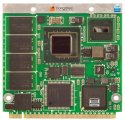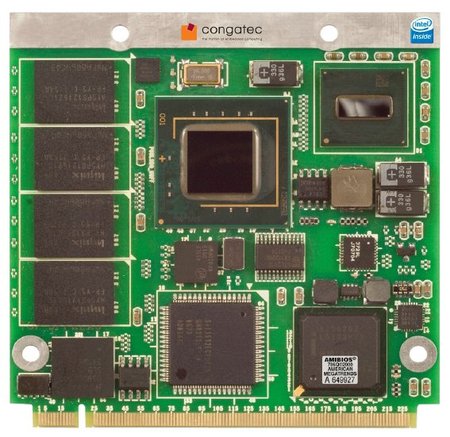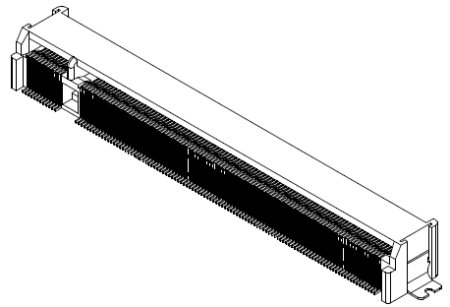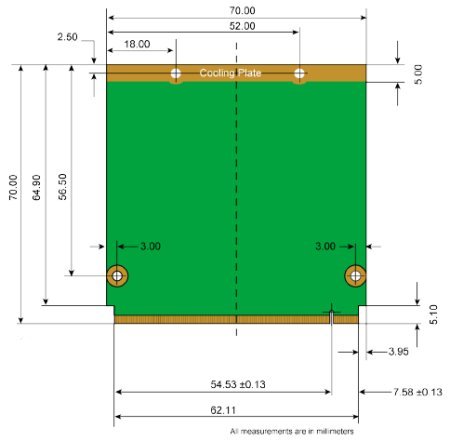“Qseven” COM standard builds on MXM
Jul 10, 2008 — by Eric Brown — from the LinuxDevices Archive — 24 views A consortium called Qseven has released a specification for a Computer-On-Modules (COM) standard that incorporates the MXM (Mobile PCI Express Module) format's finger connector. Led by Congatec, MSC Vertrieb, and Seco, the 14-member group is aiming its Qseven spec at mobile devices using 45nm-fabricated processors.
A consortium called Qseven has released a specification for a Computer-On-Modules (COM) standard that incorporates the MXM (Mobile PCI Express Module) format's finger connector. Led by Congatec, MSC Vertrieb, and Seco, the 14-member group is aiming its Qseven spec at mobile devices using 45nm-fabricated processors.
Based in Deggendorf, Germany, and announced in February, the Qseven consortium released version 1.0 of the freely available, multi-vendor Qseven spec yesterday. Like Embedian, which this week announced a new MXM-8310 COM module, Qseven adopts the “golden finger” connector from the nVidia-derived MXM graphics interconnect standard used in laptops. Qseven is slightly larger than Embedian's format, measuring 70 x 70 mm instead of Embedian's 66 x 50 mm. It also has four mounting holes instead of two.

Qseven prototype from Congatec
(Click to enlarge)
Qseven is focused on “mobile and ultra mobile applications,” says the group. Its first specification defines battery management guidelines, as well as a maximum power consumption of 12 Watts. The spec incorporates modern “fast serial differential interfaces,” including PCI Express and Serial ATA, while skipping support for legacy interfaces like EIDE and PCI. It also supports newfangled graphics and digital media specs such as DisplayPort and HDMI.
The Qseven spec is said to be the first COM standard to support SDIO, which the group says will provide for cheaper bulk memory than CompactFlash, while also enabling WLAN, Bluetooth, and RFID options. Its 8-bit SDIO interface can support MMC 4.0 cards, offering a claimed data transition rate of up to 52 MByte/s, says the consortium.
Qseven offers the following choice of interfaces:
- 4 x PCI Express x1 Lanes
- 2 x SATA
- 8 x USB 2.0
- 1000BaseT Ethernet
- SDIO 8-Bit
- LVDS 2 x 24-Bit
- SDVO / HDMI / DisplayPort (shared)
- HDA (High Definition Audio)
- I(2)C Bus
- LPC (Low Pin Count Bus)
- Fan control
- Battery management
- 5V Power (TDP max. 12 Watt)
- Application Programming Interface (API)
Qseven claims that its spec is the first COM standard that defines “an integrative software interface,” thereby providing a higher degree of compatibility, including easy swapping of compliant modules. Its API covers:
- Watchdog timer
- I(2)C bus
- LCD brightness control
- BIOS user memory
- System temperature
The quadratic 7cm (2.75 x 2.75-inch) format is 1.2mm thick and sports “solid mechanical mounting,” says the group. The MXM-compliant Foxconn ASOB3 connector, which is said to be used for laptop graphics cards, is “cost efficient,” says Qseven, and offers 230 positions, .020-inch pitch, and SMT 5.5 mm and 7.8 mm height options. The connectors are said to be certified for “rugged mobile applications” and “high-speed serial buses, such as the PEG bus.

Qseven's Foxconn MXM-based edge connector
The top edge of the card is defined for heat transfer, which is said to be enhanced by copper layers. There is also a heatspreader definition for “high power versions,” says Qseven.

Qseven spec diagram
The consortium includes 14 members, led by initiating members (and major European COM module vendors) Congatec, MSC Vertriebs, and Seco. Membership, both for participating and supporting members is free. The following is the full membership list:
- Congatec AG
- MSC Vertriebs GmbH
- Seco s.r.l
- ASEM S.p.A
- DAVE Srl
- Grossenbacher Systeme AG
- Hectronik AB
- IEI
- Portwell, Inc.
- Tranquilpc Ltd.
- Contradata
- Elektrosil GmbH
- HSM Zamecki
- Matrix Electronica
Availability
Qseven's version 1.0 spec is available now at its website. The group did not announce availability for the first Qseven-compliant COM modules.
This article was originally published on LinuxDevices.com and has been donated to the open source community by QuinStreet Inc. Please visit LinuxToday.com for up-to-date news and articles about Linux and open source.